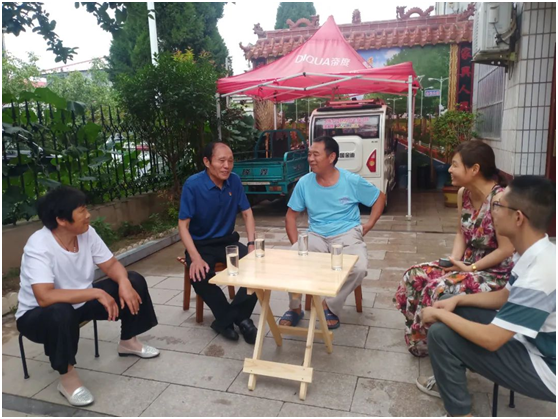NPC deputy devoted to technological promotion to drive rural vitalization

Li Liancheng (2nd from left), a deputy to the National People's Congress, visits a farmer's house to solicit ideas and suggestions for development in Xixinzhuang village, Qingzu town, Puyang county, Central China's Henan province. [Photo/npc.gov.cn]
In Xixinzhuang village in Qingzu town, Central China's Henan province, Li Liancheng, a deputy to the National People's Congress (NPC), has been committed to performing his duties in supporting rural vitalization through technology-driven growth.
Li, also Party chief of Xixinzhuang, is the key figure in attracting high-technology and eco-friendly companies to invest in the village. In 2019, he spent Spring Festival (Chinese New Year), in Shenzhen, South China's Guangdong province, to secure an infusion pumps production project, which owns dozens of patents at home and abroad.
Li said that making the village a production hub of sci-tech products is an effective way to boost rural development, and make farmers' dreams come true.
Being familiar with agriculture, rural areas and farmers, the down-to-earth NPC deputy likes to use "nine dreams" to encapsulate many of the wishes of his fellow villagers, such as access to a quality hospital, a clean environment, a prosperous life and the country's territorial integrity.
Li has a keen interest in improving farmer's knowledge and skills of agricultural technology, also one of the nine dreams he has summed up. He has effectively supported the campaign by agricultural authorities to bring science and technology to the doorsteps of farmers.
However, he was disappointed that the content and methods of such workshops have often failed to resonate with farmers. For example, some lectures were not based on the realities of rural areas, and buzzwords like "space breeding", made the villagers confused.
To address the issue, Li submitted a suggestion at the third session of the 13th NPC in 2020 to improve the campaign, which was highly valued by the Ministry of Agriculture and Rural Affairs, the Ministry of Science and Technology, and other relevant departments. His ideas included a closer alignment among sci-tech, talent and the practical needs of rural vitalization and the better organization of training workshops to operate in easy-to-understand ways.
Headed by Li, Xixinzhuang has piloted new development ideas and embraced technology-based projects. Today, the vibrant village has become home to vegetable greenhouses, a food processing industrial park, and a plant for air conditioners using advanced German technology. It has made steady progress towards industrialization, modernization, and digital transformation.
In addition, farmers here now live in new villa-like buildings, enjoy local amenities like a square and a lake for cultural and recreational activities, and have a local hospital and good educational infrastructure.
Not content with these achievements, Li said he hopes to further develop the rural collective economy, find more strong village leaders, and help farmers understand and use science and technology for a better life.



